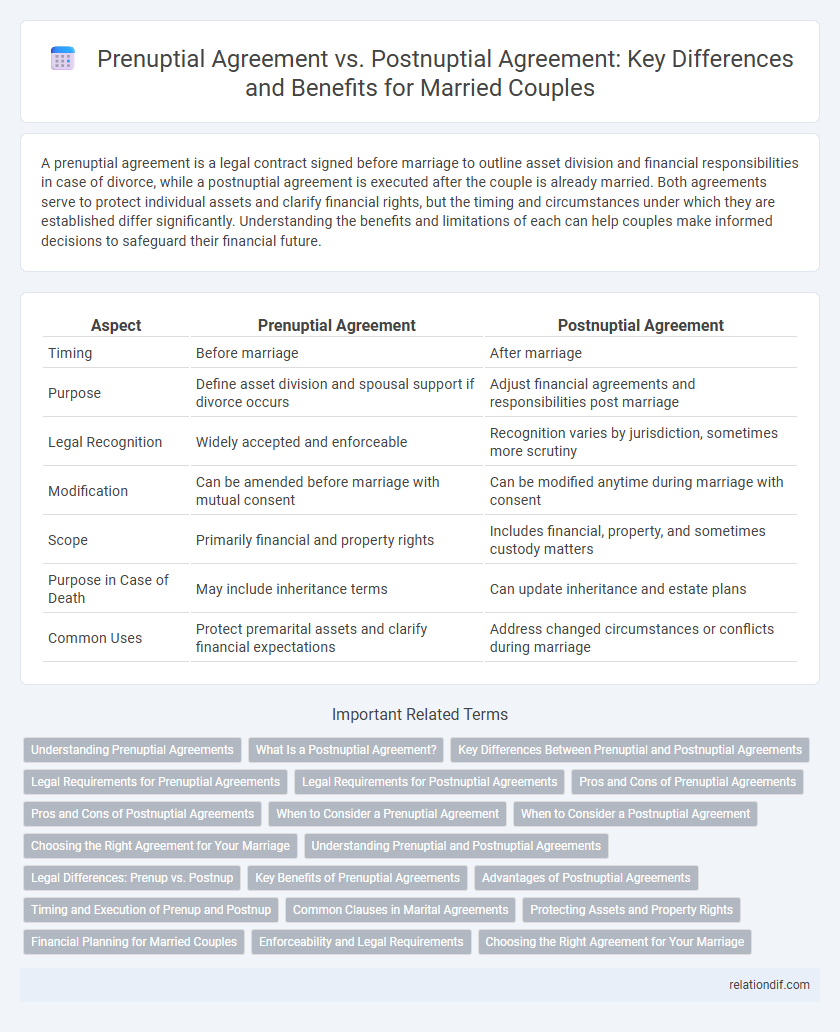A prenuptial agreement is a legal contract signed before marriage to outline asset division and financial responsibilities in case of divorce, while a postnuptial agreement is executed after the couple is already married. Both agreements serve to protect individual assets and clarify financial rights, but the timing and circumstances under which they are established differ significantly. Understanding the benefits and limitations of each can help couples make informed decisions to safeguard their financial future.
Table of Comparison
| Aspect | Prenuptial Agreement | Postnuptial Agreement |
|---|---|---|
| Timing | Before marriage | After marriage |
| Purpose | Define asset division and spousal support if divorce occurs | Adjust financial agreements and responsibilities post marriage |
| Legal Recognition | Widely accepted and enforceable | Recognition varies by jurisdiction, sometimes more scrutiny |
| Modification | Can be amended before marriage with mutual consent | Can be modified anytime during marriage with consent |
| Scope | Primarily financial and property rights | Includes financial, property, and sometimes custody matters |
| Purpose in Case of Death | May include inheritance terms | Can update inheritance and estate plans |
| Common Uses | Protect premarital assets and clarify financial expectations | Address changed circumstances or conflicts during marriage |
Understanding Prenuptial Agreements
Prenuptial agreements are legal contracts signed before marriage that outline the division of assets and financial responsibilities in the event of divorce or death. These agreements provide clarity and protection for both parties by specifying property rights, spousal support, and debt allocation. Understanding the enforceability and legal requirements of prenuptial agreements varies by jurisdiction, making it essential to seek expert legal counsel.
What Is a Postnuptial Agreement?
A postnuptial agreement is a legal contract created and signed by spouses after they are married, outlining the division of assets and financial responsibilities in case of divorce or separation. Unlike prenuptial agreements, which are established before marriage, postnuptial agreements can address financial changes that occur during the marriage. Courts generally uphold postnuptial agreements if they are fair, entered into voluntarily, and fully disclose marital assets.
Key Differences Between Prenuptial and Postnuptial Agreements
Prenuptial agreements are signed before marriage to outline asset division, debt responsibility, and spousal support in case of divorce, while postnuptial agreements are executed after marriage to address similar issues but reflect changes in circumstances. Key differences include timing of execution, legal enforceability variations by jurisdiction, and the ability of postnuptial agreements to adjust financial arrangements based on marital developments. Both agreements serve to protect individual assets and clarify financial expectations but differ primarily in their strategic use relative to the marriage timeline.
Legal Requirements for Prenuptial Agreements
Prenuptial agreements require full financial disclosure from both parties, ensuring transparency and fairness before marriage. Legal validity depends on voluntary consent, absence of fraud or coercion, and clear, enforceable terms drafted in writing. Courts typically mandate that these agreements comply with state-specific statutes, requiring notarization or witnesses to uphold the contract.
Legal Requirements for Postnuptial Agreements
Postnuptial agreements require both parties to voluntarily disclose all assets and debts to ensure enforceability under family law. Courts typically mandate that the agreement be in writing, signed by both spouses, and executed with full understanding of legal rights. Unlike prenuptial agreements, postnuptial agreements often face stricter scrutiny to confirm fairness and prevent duress at the time of signing.
Pros and Cons of Prenuptial Agreements
Prenuptial agreements provide clarity and protect individual assets before marriage, offering a legal framework to manage financial expectations and prevent disputes in case of divorce. They can safeguard inheritances and businesses but may be perceived as undermining trust or romantic commitment. The enforceability of prenuptial agreements varies by jurisdiction, and poorly drafted agreements may lead to legal challenges or unintended consequences.
Pros and Cons of Postnuptial Agreements
Postnuptial agreements allow couples to address financial matters and asset division after marriage, offering flexibility in changing circumstances such as career shifts or unexpected debts. They protect individual property rights and can minimize legal disputes during divorce, but may also generate mistrust between partners and face greater legal scrutiny compared to prenuptial agreements. Postnuptial agreements can be harder to enforce in some jurisdictions, requiring clear evidence of voluntary consent and full financial disclosure from both parties.
When to Consider a Prenuptial Agreement
A prenuptial agreement should be considered before marriage to clearly outline asset division, debt responsibility, and financial expectations, preventing potential disputes in the event of divorce. Couples with significant individual assets, business interests, or children from previous relationships benefit most from securing a prenuptial agreement. Establishing terms prior to marriage ensures legal clarity and financial protection tailored to each partner's needs.
When to Consider a Postnuptial Agreement
A Postnuptial Agreement should be considered when significant financial changes occur after marriage, such as inheritance, business growth, or debt accumulation. It provides a legal framework to reallocate assets and protect individual interests without the need for divorce. Couples facing marital challenges or anticipating future disputes may use postnuptial agreements to clarify financial rights and responsibilities.
Choosing the Right Agreement for Your Marriage
Prenuptial agreements are legal contracts signed before marriage to outline asset division and financial responsibilities, offering clarity and protection from potential disputes. Postnuptial agreements serve a similar purpose but are created after the couple is married, often to address changes in financial status or to reaffirm commitments. Selecting the right agreement depends on your current relationship stage, financial goals, and the need for legal safeguards tailored to your marriage's unique circumstances.
Prenuptial Agreement vs Postnuptial Agreement Infographic

 relationdif.com
relationdif.com